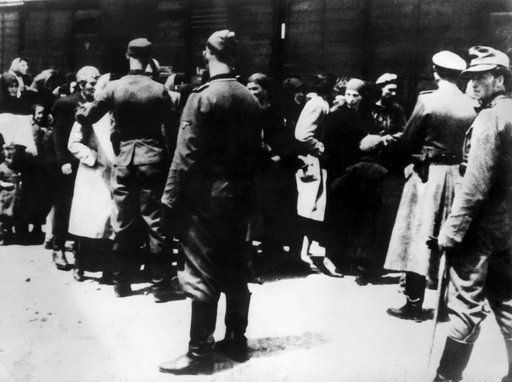The History Of Auschwitz-Birkenau

The Nazi German death camp of Auschwitz-Birkenau is an enduring symbol of the Holocaust.
Part of Nazi dictator Adolf Hitler's "Final Solution" plan for genocide against European Jews, the camp operated in the occupied southern Polish town of Oswiecim between June 1940 and January 1945.
Of the more than 1.3 million people imprisoned there, 1.1 million -- mainly Jews -- perished, either asphyxiated in the gas chambers or from starvation, exhaustion and disease.
The world marks the 75th anniversary Monday of the liberation of Auschwitz by Soviet troops on January 27, 1945.
Here is its history, based on information from the Auschwitz-Birkenau Memorial and Museum:
1939:
-- September 1: Nazi German invasion of Poland starts World War II in Europe. Nazis massacre Polish Jews or force them into ghettos, start to wipe out Poland's elites and try to stem resistance.
1940:
-- April 27: Schutzstaffel (SS) leader Heinrich Himmler picks site at barracks in Oswiecim, southern Poland, renamed Auschwitz.
-- June 14: First 728 Polish political prisoners arrive.
-- Autumn: Resistance informs exiled Polish government in London about camp, it tells Allies.
1941:
-- March 1: Himmler inspects Auschwitz, orders expansion.
-- June 22: Germany invades Soviet Union, breaking a 1939 pact, sends POWs to camp.
-- September 3: First mass gassing with Zyklon B of 600 Soviet POWs, 250 Poles.
1942:
-- January 20: Nazis set plans for "Final Solution", the genocide of Europe's Jews.
-- January: Mass gassing of Jews in Auschwitz begins.
-- March 1: "Auschwitz II-Birkenau" camp opens.
-- March: First mass deportation of foreign Jews to camp, 69,000 from France, 27,000 from Slovakia.
-- May: 300,000 Jews sent from Poland, 23,000 from Germany and Austria.
-- May 4: First Birkenau "selection" of arriving prisoners takes place, splitting those slated for slavery from those to be gassed.
-- June 10: Birkenau mutiny, seven prisoners escape, 300 die.
-- July: 60,000 Jews sent from Holland.
-- August: 25,000 Jews sent from Belgium, 10,000 from Yugoslavia.
-- October 30: Industrial "Auschwitz III-Monowitz" camp opens.
-- October: 46,000 Jews sent from today's Czech Republic.
-- December: 700 Jews sent from Norway.
1943:
-- February 26: Camp for Roma set up at Birkenau.
-- March: 55,000 Jews sent from Greece.
-- October: 7,500 Jews sent from Italy.
1944:
-- May: Allied planes photograph camp, spot gas chambers and smoke. Britain and United States later bomb Monowitz.
-- May: 438,000 Jews sent from Hungary.
-- August: 67,000 Jews sent from Lodz ghetto in Poland.
-- August 2: 3,000 Roma gassed.
-- August: 13,000 Poles sent amid Warsaw Uprising.
-- October 7: Mutiny by "Sonderkommando", Jews forced to burn bodies from gas chambers. Three SS men, 450 Sonderkommando prisoners die.
-- November: Mass gassing ends.
1945:
-- January 17: "Death March" sees SS force 60,000 prisoners west as Soviets advance.
-- January 21-26: Germans blow up Birkenau gas chambers and crematoria, withdraw as Soviet scouts approach.
-- January 27: Soviet troops arrive, find 7,000 survivors.
© Copyright AFP {{Year}}. All rights reserved.




















